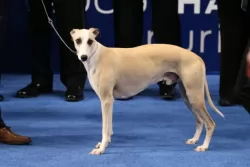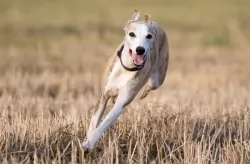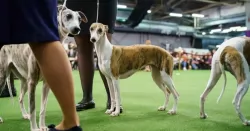 MyDogBreeds
MyDogBreeds Whippet is originated from United Kingdom but Dutch Shepherd is originated from Netherlands. Whippet may grow 6 cm / 2 inches shorter than Dutch Shepherd. Whippet may weigh 19 kg / 41 pounds lesser than Dutch Shepherd. Both Whippet and Dutch Shepherd has almost same life span. Both Whippet and Dutch Shepherd has same litter size. Whippet requires Low maintenance. But Dutch Shepherd requires Moderate maintenance
Whippet is originated from United Kingdom but Dutch Shepherd is originated from Netherlands. Whippet may grow 6 cm / 2 inches shorter than Dutch Shepherd. Whippet may weigh 19 kg / 41 pounds lesser than Dutch Shepherd. Both Whippet and Dutch Shepherd has almost same life span. Both Whippet and Dutch Shepherd has same litter size. Whippet requires Low maintenance. But Dutch Shepherd requires Moderate maintenance
 You can just see that Whippets are designed for speed with those super lean, slender bodies. They were developed by crossing Greyhounds with smaller terriers.
You can just see that Whippets are designed for speed with those super lean, slender bodies. They were developed by crossing Greyhounds with smaller terriers.
In open areas, they can pick up a high speed. In the 19th century in certain parts of England, they were used in races. They actually originated in England.
The Whippet is an ancient dog breed if you can go according to artwork which dates back to ancient Egyptian times.
They were also known as Snap dogs or small Greyhounds. You can say that the modern Whippet emerged in 1891. This was when the Kennel Club gave the breed official recognition. It was in 1888 that the dog was recognized by the American Kennel Club.
 The Dutch Shepherd is of Dutch origin, hailing from the Netherlands. They were originally used as herding dogs on the farms, where they became a jack-of-all-trades type of dog.
The Dutch Shepherd is of Dutch origin, hailing from the Netherlands. They were originally used as herding dogs on the farms, where they became a jack-of-all-trades type of dog.
The Dutch Shepherd in those days, 100 odd years ago, were also known as Hollandse Herders.
These dogs are more rare in modern days, but when you do find them, they are being used as police or security dogs, as guides for the blind, or simply as family friends.
 The Whippet is a medium-sized sighthound breed standing at between 45–56cm in height and weighing anything between 6 and 13kg.
The Whippet is a medium-sized sighthound breed standing at between 45–56cm in height and weighing anything between 6 and 13kg.
They descended from Greyhounds, resembling them in looks, just smaller. They are part of the Hound group, It’s a deep-chested dog with a long, lean head with fairy large eyes, a long neck, floppy ears and slim legs. The tail is long and slender. The coat is short and smooth and comes in many colors – tan, silver, black white, brindle and bi- or tri-colored.
The Whippet loves to run but when they’re not prancing around, they love spending time with their human family and that includes other pets as well as children.
They’re demonstrative and love showing their love for their family. They’re able to adapt to life in the city or the countryside but they will need exercising.
This is also a dog that rarely barks. They’re willful dogs so will do well with training and socialization. In fact, without proper socialization, they can become timid in unknown environments. They're intelligent so wont have problems with learning.
If you’re looking for a good watchdog and protector, you won’t find these characteristics in the Whippet.
 The Dutch Shepherd dog is very similar in appearance to the popular German Shepherds, being a medium to large sized dog.
The Dutch Shepherd dog is very similar in appearance to the popular German Shepherds, being a medium to large sized dog.
The males are slightly heavier than females, but both males and females can stand between 55 and 62cm and weigh between 20 and 32kg.
There are actually 3 varieties found in the Dutch Shepherd dogs - short-haired, long-haired, and wiry or rough-haired. The dog has a double coat, consisting of a woolly undercoat and a top coat. The basic color of the coat is gold or silver through to red, giving rise to the brindle variations. Too much black or white seen in the fur is considered a fault.
In 1914 it was decided that brindle coats would distinguish them from the others.
The eyes of the Dutch Shepherd are dark, almond shaped and slightly slanting, while the medium sized ears are erect and high on the head and the thick tail is slightly curved. The dog has an unusually long tongue which is often found hanging out.
Early training and socializing for this dog is important so that he can learn to stay calm around new people, or visitors to the property.
The beautiful Dutch Shepherd doesn’t like being left alone for too long, loving rather to be involved with all that the family is involved in. They get on well with other pets in the home as well as being child-friendly.
They are happy dogs, who can also be smart and cunning, therefore highly trainable. They soak up new commands easily. Dutch Shepherds are also good watchdogs as they are fiercely loyal, and do not take kindly to strangers.
 When you bring a sweet-natured Whippet into your life and home you’ll discover that apart from reveling in having a good run, their next favorite thing is to be resting quietly wherever their human companions are.
When you bring a sweet-natured Whippet into your life and home you’ll discover that apart from reveling in having a good run, their next favorite thing is to be resting quietly wherever their human companions are.
They’re docile dogs, loving to snuggle up to you, and not enjoying the cold. These quiet, gentle dogs are totally non- aggressive, just wanting to be with you, making you a splendid companion and pet.
 Your alert, intelligent and somewhat rare Dutch Shepherd is a loyal, protective dog, and while he can be aggressive around intruders and be a great guard dog, he can also be a gentle, loving animal around his human family members.
Your alert, intelligent and somewhat rare Dutch Shepherd is a loyal, protective dog, and while he can be aggressive around intruders and be a great guard dog, he can also be a gentle, loving animal around his human family members.
Though his tongue is long and often hangs out, you won’t have to contend with drooling. He is a wonderfully active dog and doesn’t easily gain weight. He isn’t a barker or howler, and his exceptional intelligence makes him highly trainable.
Whether there are children or other animals in the house, you can rely on your Dutch Shepherd to get on well with them, making him a wonderful family pet and canine friend.
 The lean Whippet doesn’t have any particular health problems but it is always a good idea to be clued up on some of the more common dog diseases there are.
The lean Whippet doesn’t have any particular health problems but it is always a good idea to be clued up on some of the more common dog diseases there are.
Buying a Whippet puppy from a responsible breeder will help with ensuring a healthier dog as dogs like these have had a good start and will have been vaccinated and dewormed.
This is when the heart of the dog beats too fast or too slow or it may even skip a beat. It is fairly common in dogs and it could indicate a more serious underlying condition.
An irregular heartbeat can bring about physical weakness and even loss of consciousness. Your veterinarian will want to examine your dog and listen to the history of symptoms and events that could have led to the condition. Your vet will then discuss treatment.
 The Dutch Shepherd dogs are the healthiest of the Shepherd breeds. They have relatively few health problems.
The Dutch Shepherd dogs are the healthiest of the Shepherd breeds. They have relatively few health problems.
However, like the German Shepherds they may develop hip dysplasia, but this is in fact fairly rare. Get your pet to the vet if you suspect this in your dog because it can lead to lameness.
In 2018 the University of Minnesota identified a disease in Dutch Shepherds called Miositis. This is an inflammatory myopathy causing painful inflammation of the skeletal muscle tissue.
 Whippets love running so if you’re lucky to live on a farm or at the beach, he will love those short bursts of speed in open places, chasing a ball. You can take him for a walk every day too.
Whippets love running so if you’re lucky to live on a farm or at the beach, he will love those short bursts of speed in open places, chasing a ball. You can take him for a walk every day too.
Whippets are looked upon as low maintenance dogs that don't shed much. A good brush twice a week will be adequate for this slender dog. The skin is vulnerable to cuts so check him over when you’re brushing him and make sure he hasn’t any sores or scrapes on the skin.
How much your adult dog eats depends on his size and his activity levels. Dogs are individuals and not all Whippets will eat the same amount of food. Puppies require 4 bowls of food a day while the adult Whippet will want 2 bowls of food.
There are excellent dry kibble dog foods on the market but your Whippet will also like some home-made food like chicken and vegetables. The quality of dog food you provide for your Whippet will make a huge difference to his health.
 Unfortunately Dutch Shepherds shed quite a bit of hair during their shedding period in spring and autumn. This makes regular brushing important during these seasons so as to remove the dead hairs, especially from the undercoat.
Unfortunately Dutch Shepherds shed quite a bit of hair during their shedding period in spring and autumn. This makes regular brushing important during these seasons so as to remove the dead hairs, especially from the undercoat.
The wire- or rough-haired variety shouldn’t be brushed but should rather be groomed by a professional groomer every 6 months or so.
Their nails need to be trimmed when necessary, to avoid cracking, splitting, or an injury.
Their ears can be cleaned weekly to get rid of any debris or wax build-up. This, if left, can lead to infection. Brush his teeth 2 or 3 times a week to avoid dental disease which brings on a host of illnesses.
These dogs do need regular exercising, and at the same time need to be physically and mentally stimulated. He is the kind of dog that has been used for herding purpose on the farm and he just craves activity. Take him with you on your walks and include him in ball games, hikes, jogging, swimming or when you go cycling – he is game for all kinds of activities.
The formula for their diet would be that of a medium to large dog with high energy levels. The top commercially manufactured foods have been developed to include all the important vitamins and minerals. Fish oil can also be added to their food to keep the coat shiny.
Add in cooked rice, cooked vegetables and chicken from time to time and be sure to add in some raw meat occasionally to prevent problems with the skin. Always ensure that your pet has fresh, cool water to drink.